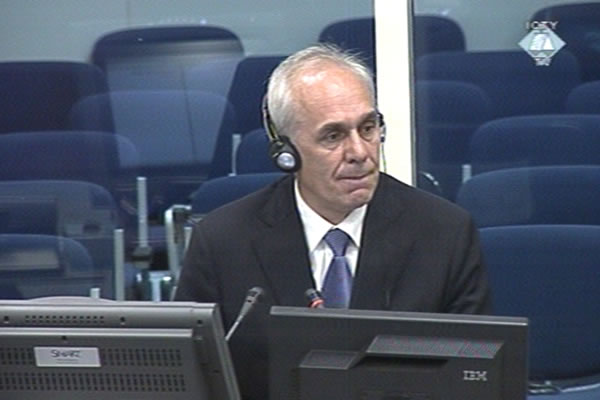Home
EXECUTIONS ‘IN WAVES’
On the second day of his testimony in Radovan Karadzic’s defense, Ljubomir Borovcanin, who commanded the police in the Srebrenica operation, first claimed that he had known only about the killing of 20 to 30 Muslim detainees in Kravica. At one point, he admitted that after 20 days he heard ‘rumors’ about ‘another wave of killings’. As alleged by the prosecution, the police subordinated to Borovcanin killed more than 1,000 detainees in Kravica. Borovcanin believes that ‘it doesn’t say anywhere’ that president Karadzic had to be informed about the massacre
 Ljubomir Borovcanin, defence witness of Radovan Karadzic
Ljubomir Borovcanin, defence witness of Radovan Karadzic The re-examination of police commander in the Srebrenica operation, Ljubomir Borovcanin, was surprisingly short by Karadzic’s standards: it took about ten minutes. In that time the accused tried to deny he had had any links with the police in the field and that he had been informed about the events from July 1995. About 8,000 Muslim men and boys were killed in Srebrenica at that time.
Borovcanin first said that the employment policy in the Republika Srpska MUP was within the sole remit of the police minister, not Radovan Karadzic. Pleading ignorance, the accused asked the witness if he as the president had to know what was going on in Srebrenica ‘if the intelligence services did their job’. The witness said that he personally was not obliged to report to Karadzic. In Borovcanin’s view, ‘it doesn’t say anywhere’ that Karadzic had to be informed.
Presiding judge Kwon recalled Borovcanin’s claim that on 13 July 1995 he knew that 20 to 30 captives were killed in the ‘first wave’ at the Kravica farm. The presiding judge asked Borovcanin if he heard that ‘another wave of killings’ followed after the ‘first wave’ and if yes, when he heard about it. The prosecution alleges that more than 1,000 Muslims were killed in the second wave. The witness replied that about 20 days after the crime he heard ‘rumors’ about the mass execution. Borovcanin learned some more details during his own trial which ended with him being sentenced to 17 years in prison. Borovcanin was found guilty of failing to prevent and punish the members of the police involved in the execution of prisoners in Kravica.
Karadzic was allowed to ask one additional question: whether Borovcanin’s ‘unit or some of its members’ participated in the Kravica massacre. Two police officers participated in the incident when 20 to 30 people were killed, Borovcanin said, ‘and that is not a unit’. The accused thus managed to achieve the addition of yet another prosecution’s exhibit against him. Prosecutor McCloskey responded to the question by tendering into evidence a list of 11 police officers who participated in the mass execution. The police officers received long-term prison sentences before the State Court in Sarajevo. Borovcanin admitted that he heard about some of those cases and that he even knew that three of those men pleaded guilty. Borovcanin found it strange that ‘suddenly, after 10 years their conscience was stirred’.
The defense case of the former Bosnian Serb president Radovan Karadzic continued with the evidence of a high-ranking RS police official, Goran Macar.Linked Reports
- Case : Karadzic
- 2013-06-06 ROLE OF ‘FRUIT PICKERS’ IN SREBRENICA MASSACRE
- 2013-06-06 KARADZIC WAS “SAD” BECAUSE MUSLIMS LEFT
- 2013-06-05 KARADZIC’S BALLISTIC EXPERT COMPLETES EVIDENCE
- 2013-06-10 FRENCH AND SERB NATIONALISTS DEFEND KARADZIC
- 2013-06-11 KARADZIC’S WITNESSES BLAME MLADIC’S ‘MILITARY CLIQUE’
- 2013-06-12 AMBASSADOR DENIES GENOCIDE AND MOCKS VICTIMS
